QuestionAre there any new medications, treatments or nutritional supplements that are shown to be effective for female rats with recurrent mammary tumors? We have a 2 1/2 year old female white rat (Wilma) who had one tumor removed 3 months ago and within this past 2 weeks developed 2 more lumps under each front arm. They seem to be growing quickly and before we choose surgery again, I would like to know if there is anything else that can be considered. She has always been a petite girl, averaging around 300gm in weight since her first tumor (which by the way was located between her pelvis and right rear leg. She is a single rat, adopted from my son's school, fed Mazuri brand lab blocks and organic vegetables (carrots, cucumber, tomatoes, squash, broccoli, peas, beans and fruit (apples, bananas, melon, berries) daily along with cheerios and rice milk for a snack. She lives in a 3 level "condo" but spends time "outside" running around monitored. She lives in a house with a dog (scared of her) and next to a goldfish tank (she seems fascinated with them). We want to do whatever is right for her. I hope there is something more that we can do either instead of or hopefully in support of surgery to prevent her from having to go thru this again. Thank you for taking the time to read this and responding.
Sincerely,
Karin M
AnswerHi Karin
I absolutely despise mammary tumors and have worked closely with female rats that have had them including my own, for several years.
Here is how the cycle works just to give you a better understanding:
Intact females produce estrogen within normal ranges usually up until the time they are menopause age, around 18 months to 24 months. After that, estrogen levels start to get very high. In turn, mammary tumors begin to develop. There is
alot of medical mumbo jumbo in between I left out and its a bit more complicated than that, but its safe to simply say that mammary tumors are fueled by estrogen. Remove the high estrogen levels and mammary tumors usually do not develop. This is why its important to spay female rats while they are still young, around 3 months old, before estrogen levels start to rise.
When you remove the mammary tumors, they grow back because the estrogen levels are still high and continue to stimulate the growth of mammary tissue, often the tumors grow back shortly after surgery which is frustrating.
Here is what you can do or rather, what I would do and have done. Remove the new growths one more time and after she recovers, there is a drug called LUPRON that is a hormone itself that halts estrogen production. It is used in ferrets for adrenal disease and also is used for humans as well.
Not every vet has heard of using lupron to prevent mammary tumor growth so you may need to suggest this to your vet and if he or she has a problem with using it or has questions you can have him contact me directly for further information. Lupron is to be used once a month.
Another drug is tamoxifen, which is used in humans to shrink cancerous breast tumors. However, it only has success rates shrinking cancerous tumors in rats and at least 9 out of 10 mammary tumors are benign, which makes tamoxifen useless.
As for lupron, it doesn't matter if the tumors are cancerous or benign, because it stops estrogen production in general and no tumors should form. It has a success rate in also slowing down tumors that are already growing, but they still continue to grown and that creates a problem.
If you allow the rat to keep the tumors, they will become vascular and start to rob her body of the proper nutrients she needs to sustain her vital organs and keep them working properly. She will lose weight despite how much she eats.
Her organs will slowly begin to fail, the tumor loses its blood supply after it becomes to big and it becomes necrotic. It may abscess internally, dumping the toxins into the rats body which in turn causes sepsis and it is fatal at this point.
This can occur in months, depending on how fast the tumors grow. To me age is not a disease, it is a number and I have had rats as old as 3 years old have tumors removed and lupron treatments started. She lived another 8 months and was a few months shy of her 4th birthday before she passed away.
As I said earlier, I hate mammary tumors and what they do to our female rats. I try to educate every rat owner that has females about the treatments available for mammary tumors but also stress the need to spay all females at an early age to prevent the growth of mammary tumors and pituitary tumors too.
i
Hope this helps and remember if the vet has any thing he needs to ask about lupron he can reach me at sandyscrittercity@yahoo.com

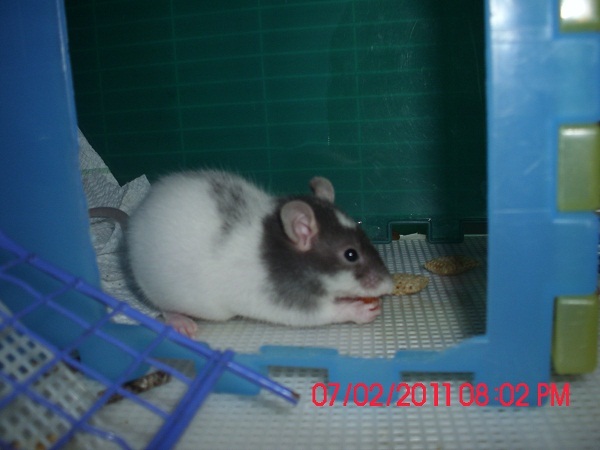 rat not able to climb down
QuestionFlute is probably 2 months old and was all alon
rat not able to climb down
QuestionFlute is probably 2 months old and was all alon
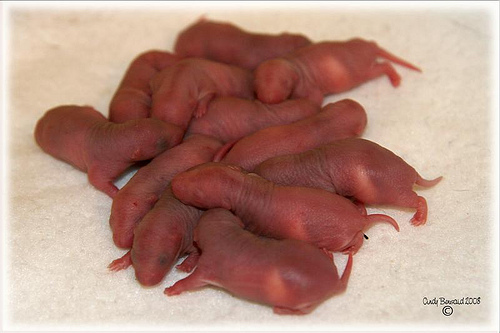 are newborn ratties nursing ?
QuestionQUESTION: **** I have a concern and found you t
are newborn ratties nursing ?
QuestionQUESTION: **** I have a concern and found you t
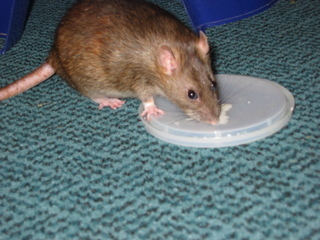 smudge
QuestionQUESTION: He is so cute!!! He looks alot like J
smudge
QuestionQUESTION: He is so cute!!! He looks alot like J
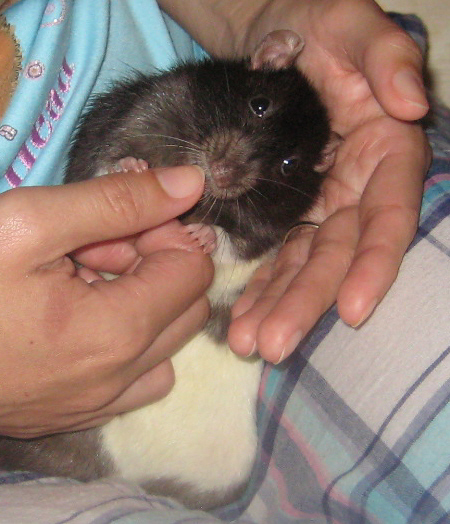 Suffering & guilt
QuestionQUESTION: Hi Sandra. This isnt a question, I ju
Suffering & guilt
QuestionQUESTION: Hi Sandra. This isnt a question, I ju
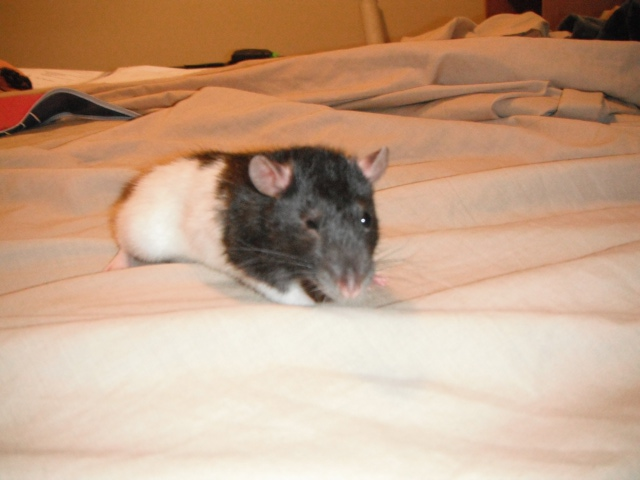 Rat with sore eye
Question
Female rat
Today I bought a female rat
Rat with sore eye
Question
Female rat
Today I bought a female rat